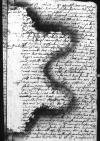Aus Ewer Herlichkeit ⌊⌋ und aus den copeyen dar bey, / das wir gestrigs tags erhaltnn, / hab wir vorstandenn, wie die sache mit der zceisen ein gestalt wil gewynnenn, / nemlich so der her ⌊Pomrelsche woywod⌋ mit ⌊den von ⌊Thornn⌋⌋, Ewer Herlichkeit ⌊eldsten⌋ und ⌊den vomm ⌊Elbing⌋⌋ kein antwurt gegebenn und helt sich also, / omne regnum in se divisum etc., wo ouch ein teil sein eigenn / und das ander den gemeinenn nucz vorso... wil sichs nicht gleich gleich zcyhen. / Der wegen wisse wir nicht sonders Ewer Herlichkeit ⌊eldstenn⌋ zu rotenn, / dan, / so die andren vorgenantenn darzu vorwiltenn, / das ⌊koniglicher majestet⌋, unsers allergnedigsten hern, uff die formm geschribenn wurd, / wie der hochwirdige ⌊her von ⌊Colmesze⌋⌋, das Ewer Herlichkeit villeicht weis, begriffenn, / do mit amm hove vormerck, / das wir ouch uff uns selbst achtung habnn. / Wirt dis vorbleibnn, / der hoff wirt nicht noch lossen weiter zu greiffen etc. Das gelt under uns gefallnn leit zum ⌊Braunsberge⌋, / darnoch wir sehen, wie sich der mherer teil wirt schickenn, wolle wir uns ouch richtenn. / Hiebey findt Ewer Herlichkeit, was uns das ⌊Beyn⌋ geschribnn, und unser antwurt. / Wir wartenn alle und disse stunde unsers botens von hove, / do hyn wir den XXII des negst vorgangenn monts weitlofftig geschribnn. / Her ⌊Fabian Woynowski⌋ hot uns hie angeczeigt unser ⌊gnedigsten frawenn⌋ befhel, / das sich dohin streckt wie zuvor, / das alle dink hie von uns flissenn und in unsermm rothe nymant besser sey dan ⌊Pomerellenn⌋ und ⌊Strosberg⌋, / wie sol es dan recht bey uns zu ghenn etc. Es hot uns ouch der her deckent von ⌊Krako⌋ ⌊Maczyeowski⌋ ⌊⌋ und getrost, wir sollnn uns nichts lossenn anfechtnn, / ⌊konigliche majestet⌋ sey unser gnedigster her etc. Was das burgraff ampt betrifft, / wolle wir, so bald unser bot von hove an uns gelangt, / nicht vorgessenn unnd alles thun, / wie zuvor Ewer Herlichkeit von uns erfarenn etc. Von ⌊romischer koniglicher majestet⌋ hove hab wir kein antwurt, / wollen abermols schreibnn. / Wer gut, / so das gemelde und instructionn villeicht vorlorenn, / das uns Ewer Herlichkeit anders zuschickte etc. Ewer Herlichkeit svacheit, / und das die sich so offte vornewet, / bringt uns bekömern. / Ewer Herlichkeit wolde sich selbst nicht absthenn und ir gesuntheit fleis habenn, / darinnen Got Ewer Herlichkeit zu langenn zceitnn wolle vorhaltenn etc. Die meynung ⌊koniglicher majestet⌋ zu schreibnn, / vorsorgung des ports, / wolle wir im korczen vortstellen. Newe zceitungen hab wir hern ⌊Fabian⌋ Ewer Herlichkeit zu schreiben befolenn. / Unser ohmm ⌊Simonn⌋ bit Ewer Herlichkeit uff sein ehefreudt gen ⌊Wartenberg⌋ / den negstnn suntag, / do hin wir uns mit der hulff Gots morgen begebenn etc. Hie bey dissen briff an unsernn vortrawtnn fr[eunt], den hern ⌊Danczker castellann⌋ wolt bestellen. Got in sein gnad mit al den irenn, / welche die unsernn alle vil dinst und guts entpittnn, / befolen.

